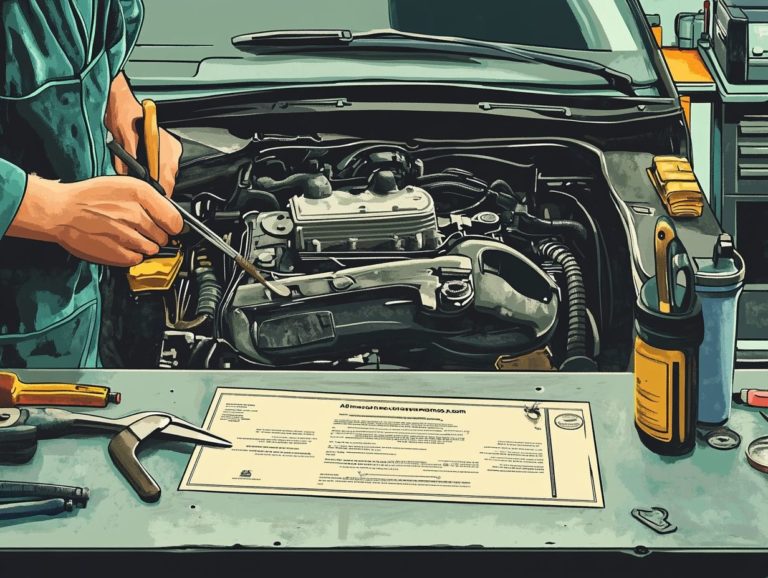What is a Car Warranty Blackout Period?
Safeguarding your investment in a vehicle means understanding the intricacies of car warranties. It’s absolutely essential to grasp what these warranties entail.
Car warranties offer vital coverage and come with specific terms. One term you should know is the blackout period.
This article explores what a car warranty is, the various types available, and the implications of a blackout period. You ll learn why these periods exist and how to navigate them effectively.
Plus, you’ll find tips for evading them altogether, ensuring your car remains protected without unexpected surprises.
Contents
- Key Takeaways:
- Understanding Car Warranties
- What is a Blackout Period?
- Why Car Warranties Have Blackout Periods
- How to Navigate a Blackout Period
- How to Avoid Blackout Periods in Car Warranties
- Frequently Asked Questions
- What is a Car Warranty Blackout Period?
- Why do car warranties have blackout periods?
- When does a car warranty blackout period typically occur?
- What types of repairs or services are typically not covered during a car warranty blackout period?
- Can a car warranty blackout period be extended?
- How can I avoid having to deal with a car warranty blackout period?
Key Takeaways:

- A car warranty is a contract covering specific repairs for a set time.
- A blackout period is a timeframe during which certain repairs may not be covered.
- To avoid a blackout period, carefully review your warranty’s terms and consider alternative options.
Understanding Car Warranties
Understanding car warranties is crucial for every vehicle owner. They serve as a safety net for unexpected car problems.
Whether it’s a factory warranty or a third-party warranty, these contracts can greatly influence your car maintenance costs. This is especially true for high-mileage vehicles and luxury brands like BMW and Tesla.
By fully grasping your vehicle service contract, you can keep your vehicle safe and sound. This includes enjoying benefits like roadside assistance and rental car reimbursement.
What is a Car Warranty?
A car warranty is your ticket to vehicle protection. It shields you from certain mechanical failures and defects.
This warranty provides peace of mind for both new and used cars. Warranties cover specific parts of your vehicle for a predetermined period, usually ranging from three to seven years.
Factory warranties typically cover essential parts like the engine, transmission, and electrical systems. They may also include perks such as roadside assistance.
Third-party options can offer more extensive coverage, sometimes including wear-and-tear protection and additional services. This means you can enjoy your journey on the road with full confidence.
Types of Car Warranties
There are various car warranties available, each tailored to meet specific needs. These include extended warranties, factory warranties, and specialized options like powertrain and bumper-to-bumper coverage.
Understanding these warranties is important, especially for owners of high-mileage vehicles. Certain options are designed to address unique concerns.
Factory warranties usually cover defects for a limited duration typically three to five years or up to a specific mileage. In contrast, extended warranties provide additional protection once factory coverage ends.
If you re concerned about major components, powertrain warranties cover critical parts like the engine and transmission. Bumper-to-bumper coverage ensures comprehensive protection against unexpected repairs.
What is a Blackout Period?

A blackout period in automotive warranties is a specific waiting time. During this time, certain repairs or claims are off-limits.
This can often confuse car owners, especially regarding warranty fraud and pre-existing conditions.
Definition and Explanation
A blackout period is when your vehicle’s warranty coverage for specific repairs is temporarily suspended.
This typically occurs during significant maintenance work, such as an engine overhaul or transmission replacement.
If you do extensive modifications or repairs outside the standard coverage, you may enter a blackout phase.
In this phase, certain repair claims may not be honored.
Common scenarios are aftermarket installations or damage from neglect.
These can disrupt the usual claims process tied to your warranty.
Why Car Warranties Have Blackout Periods
Car warranties include blackout periods to ensure valid claims.
They help protect against misuse of warranty coverage.
Purpose and Benefits
Blackout periods help maintain the integrity of warranty claims.
This creates a framework that encourages responsible use of your warranty.
These intervals uphold the quality of vehicle repairs.
They also protect the warranty provider from unexpected expenses.
This balance encourages you to follow proper maintenance schedules.
Doing so extends your car’s lifespan and protects your investment.
With a clear framework for protection guarantees, both you and the warranty provider can navigate vehicle ownership easily.

Navigating a blackout period can be challenging.
Understand your coverage and take a proactive approach to car repairs.
Tips for Managing Car Repairs
To manage repairs during a blackout period, keep a regular maintenance schedule.
Be mindful of your driving habits to prevent problems.
Prioritize routine check-ups and follow recommended service intervals.
This reduces the likelihood of unexpected breakdowns.
Monitor your driving behavior as aggressive driving can cause premature wear.
Implement preventative measures like regular oil changes to enhance longevity.
Consider maintenance coverage that protects against unforeseen repairs.
This ensures smooth operation and reduces stress during tough times.
How to Avoid Blackout Periods in Car Warranties
Navigate blackout periods by choosing your coverage options wisely.
Fully understand the terms of your warranty, including extended warranty plans.
Alternative Options for Coverage
Exploring alternative options for coverage, such as extended warranties and third-party warranties, can grant you additional vehicle protection and flexibility to sidestep pesky blackout periods.
These options enhance manufacturer warranties and cater to your unique needs. For example, extended warranties typically cover repairs beyond the manufacturer s warranty period, offering peace of mind as your vehicle ages. While they can be pricey and may come with specific limitations, they often provide valuable reassurance.
On the flip side, third-party warranties frequently feature lower premiums and customizable plans, making them an appealing choice for those seeking tailored coverage. Just be careful choose wisely! Not all providers deliver the same level of service or reliability when it comes to claims. Striking the right balance between cost and coverage is crucial for ensuring optimal vehicle protection.
Frequently Asked Questions

What is a Car Warranty Blackout Period?
A car warranty blackout period is a time when some repairs are not covered by your warranty.
Why do car warranties have blackout periods?
Car warranties have blackout periods to prevent fraudulent claims and ensure that the warranty company isn’t responsible for pre-existing issues or damage.
When does a car warranty blackout period typically occur?
A car warranty blackout period usually occurs during the first few months or the first few thousand miles of the warranty coverage.
What types of repairs or services are typically not covered during a car warranty blackout period?
During a car warranty blackout period, repairs or services that are not covered may include wear and tear items, pre-existing issues, or damages caused by the owner’s negligence or misuse of the vehicle.
Can a car warranty blackout period be extended?
In most cases, a car warranty blackout period cannot be extended. However, some warranty companies may offer extensions for an additional cost.
How can I avoid having to deal with a car warranty blackout period?
To avoid dealing with a car warranty blackout period, properly maintain your vehicle and address any minor repairs before they become major problems. Regularly servicing your vehicle and following the manufacturer’s recommended maintenance schedule can help prevent unexpected repairs during a blackout period.
Explore coverage options today to protect your vehicle!






